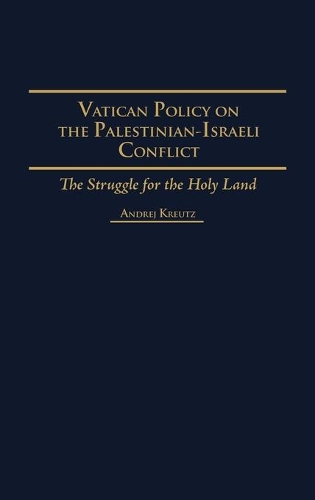
Vatican Policy on the Palestinian-Israeli Conflict: The Struggle for the Holy Land
(Hardback)
Publishing Details
Vatican Policy on the Palestinian-Israeli Conflict: The Struggle for the Holy Land
By (Author) Andrej Kreutz
Bloomsbury Publishing PLC
Praeger Publishers Inc
8th February 1990
United States
Classifications
Tertiary Education
Non Fiction
International relations
327.456340569409
Physical Properties
Hardback
208
Description
The Vatican's foreign relations, particularly their Middle Eastern aspects, are generally little known. This book attempts to clear up the misunderstandings and misconceptions with regard to the Vatican's policy in the Middle East. For more than a thousand years, the Holy See has been inextricably involved in the Middle East; indeed, the very roots of the Roman Catholic Church originate there. Yet despite the religious overtones of the Holy Land issue, Kreutz argues that the Vatican's Middle Eastern policy is much more than an expression of its religious and secular ideology, it is the reflection of the social, political and economic climate. The study begins with background on the Roman Catholic Church and its links to the Third World, especially the Middle East. The balance of the book provides a chronological historical analysis of the Vatican's involvement in the Palestinian problem from 1900 to 1988. Kreutz covers Zionist settlement in Palestine, the Holocaust, the 1947-1948 partition plan, the creation of Israel and the Arab refugee problem. He focuses on the aftermath of the Arab-Israeli Six Day War in 1967, including the growth of the Palestinian national movement, and the present-day attitude of the Vatican under Pope John Paul II.
Reviews
"The book in its historical part is largely based on meticulous and original research in the newly opened American and European archives. The author provides in a comparatively short book a comprehensive picture of the complex evolution of Vatican-Palestinian/Zionist relations in the context of the 20th century background of the region."-T. Y. Ismael Department of Political Science, The University of Calgary
"The international relations of the Vatican is a topic strangely neglected by political scientists. The present book intends to correct this. It offers an excellent study of contemporary interest, based on data not easily available, analyzing the evolving relationship of the Vatican to the Palestinian people."-Gregory Baum Religious Studies, McGill University
"This volume makes an important contribution to a much neglected subject, the relationship between the Vatican and the Palestinian community....It is must reading for everybody who is interested in the contemporary Middle East."-Janice Gross Stein Professor of Political Science, University of Toronto
"This well-researched, balanced, and comprehensive work on the papacy and the Palestinians is obligatory reading for anyone interested in Vatican politics and in the recent history of the Middle East."-Jean-Guy Vaillancourt Professor of Sociology, Universite de Montreal
Starting with an examination of the Roman Catholic Church a a religious and political institution and of its foreign policy-making process, the book proceeds to a detailed history of the events and motivating elements of Vatican policy toward Palestine, Zionism, Israel, and the future of the Palestinians. Noting the Vatican's acceptance and considerable dialogue with Israel, the author concludes that the Vatican will not agree to full diplomatic relations "until full and just settlement of the Palestinian question."-Booknotes
"Starting with an examination of the Roman Catholic Church a a religious and political institution and of its foreign policy-making process, the book proceeds to a detailed history of the events and motivating elements of Vatican policy toward Palestine, Zionism, Israel, and the future of the Palestinians. Noting the Vatican's acceptance and considerable dialogue with Israel, the author concludes that the Vatican will not agree to full diplomatic relations "until full and just settlement of the Palestinian question.""-Booknotes
Author Bio
ANDREJ KREUTZ trained in international law and European history at the Jagiello University in Cracow, Poland, and in comparative and international politics at the University of Toronto. He has published extensively in European and American journals on issues related to Eastern Europe, the Middle East, and the Vatican. His particular field of interest is interactions between religious beliefs and institutions and politics.
